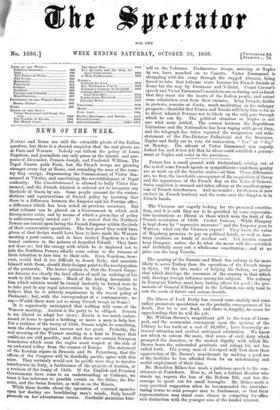NEWS OF THE WEEK.
NAPLES and Rome are still the ostensible pivots of the Italian question, but there is a shrewd suspicion that the real pivots are at Paris and Warsaw. Nobody can fathom the policy of Louis Napoleon, and journalists can only guess at the intents and pur- poses of Alexander, Francis Joseph, and Frederick William. The Papal Nuncio quits Paris, but the French troops are growing stronger every day at Rome, and extending the area of the coun- try they occupy, dispossessing the Commissioner of Victor Em- manuel at Viterbo, and sanctioning the reestablishment of Papal authority. The. C'onstitutionnel is allowed to bully Victor Em- manuel, and-the French Admiral is ordered not to recognize any blockadeof Gaeta by sea. Some people account for the contra- dictions and equivocations of French policy by insisting that there is a difference between the Emperor and his Foreign office, a difference which has been noted on previous occasions. Brit what reliance can be placed on a Government in which such divergencies exist, and by moans of which a given line of policy is subterraneously carried out ? It is stated that the Northern • Powers are intent upon luring the French Emperor within the circle of their conservative operations. The best proof they could have given of that design would have been to have made the Warsaw meeting a parti carree, and to have invited Napoleon to a fro; ternal embrace in the palaces of despoiled Poland. They have not done so ; but the energy with which he is implored not to join the Northern Powers affords some colour to the rumour of their intention to lure him to their side. Even Napoleon, how- ever, would find it too difficult to desert Italy, and associate himself with them, should their designs point to the resubjugation of the peninsula. The better opinion is, that the French Empe- ror foresees too clearly the fatal effects of such an undoing of his work to fall into the snare. Much of the feeling favourable to him which subsists would be turned instantly to hatred wore he to take part in any regal intervention in Italy. We incline to believe that he is actively acquiescent in the recent policy of Piedmont; .but, .with the correspondent of a contemporary, we say—Would there were not so many French troops in Rome!
It is sagaciously anticipated that nothing will come of the Warsaw meeting. Austria is the party to be obliged. Prussia is too liberal to adopt her views ; Russia is too much embar- rassed at home to spend a farthing or move a man to help her. For a revision of the treaty of 1856, Russia might do something, were the chances against success not too great. Probably, the real meaning of the Warsaw meeting is a hint to France that coalitions are still possible, and that there are certain European boundaries which even the eagles must respect at the risk of an awkward volley from the cannon of Europe. The statement of the Russian organs in Brussels and St. Petersburg, that the effects of the Congress will be decidedly pacific, agree with this view. They certainly would not be pacific were they to involve Interference in Italy, a furtherance of the projects of Austria, or a revision of the treaty of 1856. If the English and Prussian Governments have come to an understanding at Coblentz, we trust it has reference to possible events on the Rhine, the Da- nube, and the Swiss frontier, as well as on the Mincio. While these doubts about the operation of external agencies upon her destiny are bewildering men's minds, Italy herself proceeds on her adventurous course. Garibaldi maintains him- self on the Volturno. Piedmontese troops, arriving at Naples by sea, have marched on to Caserta. Victor Emmanuel is struggling with his army through the rugged Abruzzi, being forced to take that toilsome route because his French friends at Rome bar the way by Frosiuone and Velletri. Count Cavour's speech and "Victor Emmanuel's manifesto are so daring and so frank that they must stir the hearts of the Italian people, and extort sonic admiration even from their enemies. King Francis, fertile in protests, remains at Gaeta, much meditating on his unhappy prospects ; thankful that France and Russia will help him so far as to direct Admiral Persano not to block up the only gate through which he can fly. The political situation at Naples is not one whit more settled. The contest between the Republican Unitarians and the Nationalists has been raging with great fury, and the telegraph has twice reported the resignation and rein- statement of the Pro-Dictator Pallavicini and the Ministers.
Naples and Sicily are to vote for annexation, A es or o," on Monday. The advent of Victor Emmanuel was eagerly looked for, and it was felt that he alone could establish a govern- ment at Naples and order in the provinces.


























